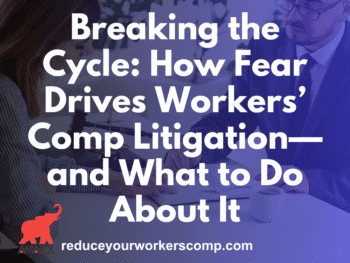How Would You Decide: Death of Workers’ Compensation “Private Eye” Did Not Arise Out of Nor Was it in the Course of the Employment
Here’s What Happened…
Anderson worked for Veracity Research, investigating workers’ compensation claimants who were suspected of fraud. He was killed in a one-car accident on July 19, 2003. He was survived by his wife and two minor children. His family sought workers’ compensation death benefits. The Division of Workers’ Compensation acknowledged receipt of the claim on February 24, 2004, but Veracity did not file its answer until August 2005.
The fatal accident occurred two miles from the hotel in which Anderson was staying in Blue Springs, some distance from Anderson’s home in Wichita. It was also near the residential street of the subject Anderson was assigned to observe. The accident occurred around midnight when Anderson’s vehicle failed to successfully navigate a curve in the road. A professional engineer testifying on behalf of Anderson’s family concluded that speed was the proximate cause of Anderson’s fatal accident, though other factors were also implicated, including alcohol, darkness, and road curve design.
Veracity contended the accident was caused by Anderson’s intoxication, that he had deviated from the course and scope of his employment at the time of the fatal wreck. Anderson’s blood alcohol content was 0.221 at the time of his death, indicating that he had ten to eleven alcoholic drinks in his system at the time of his death.
The administrative law judge concluded that Veracity’s untimely answer did not prevent it from defending against the claim. She further found that Anderson’s fatal accident did not arise out of and was not in the course and scope of his employment. The Labor and Industrial Relations Commission agreed and the family appealed.
Here’s What The Court Decided:
In Anderson v. Veracity Research Co., 2009 Mo. App. LEXIS 1570 (Nov. 10, 2009), the Court of Appeals of Missouri (Western Dist.) affirmed. The court agreed with Veracity’s contention that its failure to file a timely answer resulted in an admission of the facts alleged in the claim for compensation but that whether Anderson’s death arose out of and in the course and scope of his employment was a question of law that could not be waived.
As to the family’s contention that Anderson was a traveling employee, that except for clear deviations from the employment, he should be afforded portal-to-portal protections, the appellate generally agreed that the nature of the duties performed by traveling employees did broaden the parameters of compensability, but the court also observed that the underlying burden of proof was still with the employee (or survivors) to show that he was acting in the course and scope of his employment at the time of a particular incident. The court said moreover, as the Missouri cases demonstrated, any inference or presumption arising from the fact that an employee in a particular case was injured while on a business trip must yield to specific evidence as to the circumstances surrounding a particular worker’s injuries or death. (workersxzcompxzkit)
The court observed that Anderson had none of the “tools of his trade” in his car (laptop, clipboard, camcorder, tapes for camcorder, cell phone, cell phone charger, cell phone earpiece) that were required when conducting surveillance. Indeed, they were all in his hotel room. The accident occurred around midnight, many hours after Anderson’s normal quitting time. There was no evidence that Anderson had been authorized or requested to work past normal working hours. Anderson was intoxicated at the time of the accident. Consumption of alcohol while on the job was not permitted. A reasonable fact finder could conclude, therefore, from the evidence that Anderson’s accident did not arise out of and in the course of his employment. The court concluded that substantial evidence supported the determination that Anderson was not serving his employer’s interests at the time of the accident.
See generally Larson’s Workers’ Compensation Law, §§ 17.01, 17.03, 17.06, 25.01, 25.03, 36.02.
Tom Robinson, J.D. is the primary upkeep writer for Larson’s Workers’ Compensation Law (LexisNexis) and Larson’s Workers’ Compensation, Desk Edition (LexisNexis). He is a contributing writer for California Compensation Cases (LexisNexis) and Benefits Review Board – Longshore Reporter(LexisNexis), and is a contributing author to New York Workers’ Compensation Handbook(LexisNexis). Robinson is an authority in the area of workers’ compensation and we are happy to have him as a Guest Contributor to Workers’ Comp Kit Blog. Tom can be reached at: compwriter@gmail.com.
http://law.lexisnexis.com/practiceareas/Workers-Compensation
Write for Us? Contact: Info@WorkersCompKit.com.
FREE WC IQ Test: http://www.workerscompkit.com/intro/
WC Books: http://www.reduceyourworkerscomp.com/workers-comp-books-manuals.php
TD Calculator: www.ReduceYourWorkersComp.com/transitional-duty-cost-calculator.php
WC Calculator: www.reduceyourworkerscomp.com/calculator.php
Follow Us On Twitter: www.twitter.com/WorkersCompKit
NEW ARTICLE: Return to Work in Unionized Companies
http://reduceyourworkerscomp.com/Return-to-Work-Programs-Unionized-Companies.php
Do not use this information without independent verification. All state laws vary. You should consult with your insurance broker about workers’ comp issues.
©2009 Amaxx Risk Solutions, Inc. All rights reserved under International Copyright Law. If you would like permission to reprint this material, contact Info@WorkersCompKit.com



























